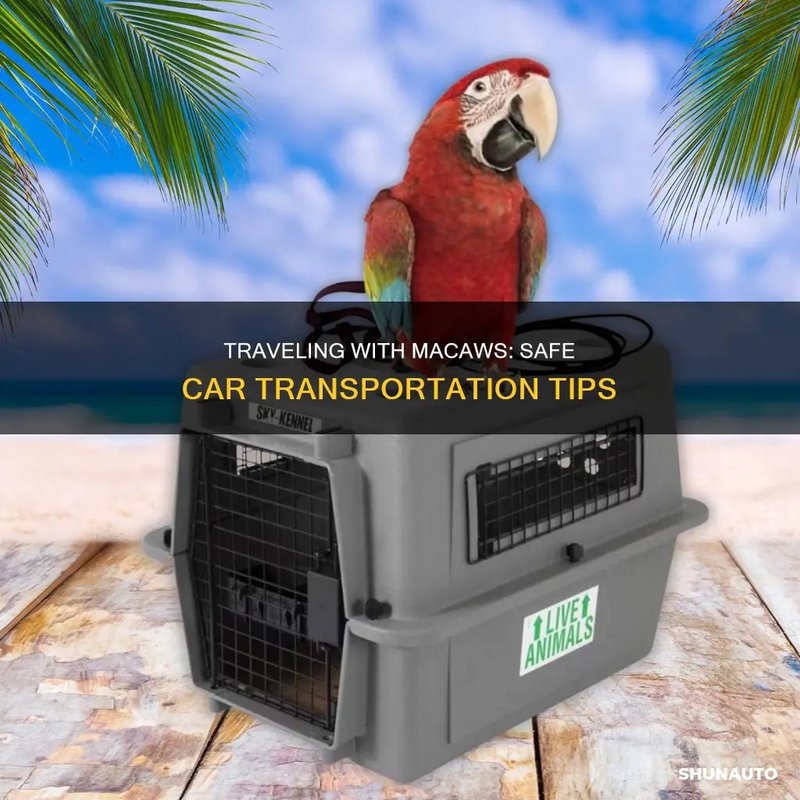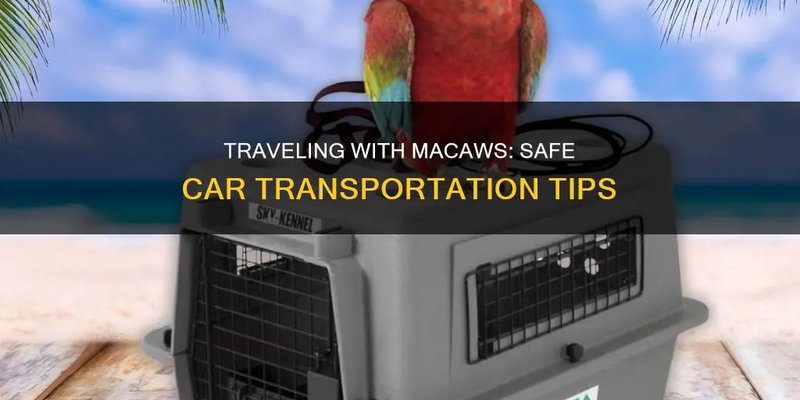
Imagine packing for a vacation but having to consider not just your clothes and snacks, but also ensuring that your feathered friend is happy and safe. This means understanding their needs, how to transport them, and what regulations you might face when traveling. Let’s dig into the essentials to help make your journey with your macaw both enjoyable and stress-free.
Understanding Your Macaw’s Needs
Before you embark on any adventure, it’s crucial to understand your macaw’s basic requirements. These birds are not just pets; they are social creatures that thrive on interaction and mental stimulation. This means you should think about how to keep them entertained during the journey.
First off, macaws need plenty of social interaction. If your feathered friend is used to being around people frequently, a long trip away from home can be a challenge. Try to engage with them before and during the journey. Bring along some of their favorite toys or a new puzzle to keep their minds active.
Next, consider their diet and hydration. Macaws require a balanced diet of pellets, fruits, and veggies, plus access to clean water. Bring along a travel-friendly water bottle and some of their favorite snacks to ensure they’re well-fed. Hydration is especially important during flights or drives, as travel can be stressful for them.
Finally, think about comfort and security. Macaws can be sensitive to new environments. Creating a familiar space within their travel cage can help ease anxiety. Covering their carrier with a light cloth can also provide a sense of security during travel.
Choosing the Right Traveling Cage
When it comes to traveling with a macaw, the cage you choose is almost as important as the feathers on their back. A suitable travel cage should be spacious enough for them to move around but small enough to be practical for transport. Here’s what to consider:
– Size: Macaws are large birds, so their travel cage should give them room to spread their wings. Look for cages that are at least 24 inches wide and tall. They should be able to stand comfortably without hitting their head.
– Material: Opt for a sturdy cage made from bird-safe materials. Stainless steel or powder-coated metal are great choices. Avoid cages with plastic parts that could weaken over time.
– Ventilation: Good airflow is essential. Make sure the cage has multiple openings or mesh panels to allow fresh air in.
– Secure Locks: Macaws are clever and curious creatures. Ensure that the cage has secure locks to prevent any escape attempts during your travels.
Choosing the right cage is fundamental for both their comfort and your peace of mind. A well-designed travel cage makes it easier to manage the journey and also helps your macaw feel secure.
Preparing for Travel: Paperwork and Regulations
Traveling with a macaw isn’t just about packing and planning—there’s a bit of red tape involved too. Depending on where you’re going, you may need specific paperwork. Here’s a guide to getting it right:
– Health Certificates: Many airlines and even states require a health certificate for your macaw, especially if you’re flying. This usually needs to be issued by a veterinarian within a certain time frame before travel, typically within 30 days.
– Import/Export Permits: If you’re traveling internationally, check the regulations of the country you’re visiting. Some countries have strict pet import regulations, and you may need additional permits.
– Airline Policies: If flying, check the airline’s pet policy. Each airline has different rules regarding traveling with pets, including whether your macaw can sit in the cabin with you or whether they’ll need to go in cargo.
Being well-prepared with the correct paperwork can save you a lot of stress at the airport or border crossings. Double-checking this in advance means you can focus on enjoying your trip together.
Traveling by Car: Tips for a Smooth Ride
Road trips can be exciting! But they can also be daunting when you’re traveling with a macaw. Here are some tips to ensure a smooth ride for both of you:
– Secure the Travel Cage: Make sure the cage is firmly secured in the vehicle. You don’t want it sliding around during sharp turns or stops. Ideally, the cage should be in the backseat for safety and stability.
– Limit Distractions: Just like little kids, macaws can get restless and anxious in a moving vehicle. Limit loud music or intense conversations to keep your focus on the road and your feathered friend.
– Schedule Regular Breaks: Plan for breaks every couple of hours. This gives your macaw a chance to stretch their wings (in a safe space) and drink water. It also provides a good excuse for you to stretch your legs!
– Ventilation: Keep the car well-ventilated, but avoid drafts. You don’t want your macaw to get too hot or cold, so find that sweet spot.
By keeping their comfort in mind, you both can enjoy the journey and arrive at your destination ready for fun.
Air Travel: What to Expect
Flying with a macaw can be a different ball game compared to road trips. Here’s what you need to know to make air travel less stressful:
– Check Airline Policies: Before booking your flight, read through the pet policy of the airline. Some airlines may have restrictions on the size or breed of birds allowed in the cabin.
– Prepare the Carrier: Make sure your macaw’s travel carrier meets airline specifications. It needs to be secure and spacious enough for your bird to stand comfortably. Practice having your macaw spend time inside the carrier before the trip so they become familiar with it.
– Arrival at the Airport: Arrive early to give yourself enough time to navigate check-in and security. Don’t forget to bring all necessary paperwork, as security may want to see health certificates.
– During the Flight: It can be beneficial to cover the carrier with a breathable cloth. This can help your macaw feel secure, as it simulates their natural environment. Just keep a close eye on them to ensure they’re comfortable and calm.
Traveling by air can be overwhelming, but with the right preparation, it can be a smooth experience.
Keeping Your Macaw Calm and Happy
While traveling can be stressful for macaws, there are several ways to keep them calm. Here’s how you can help:
– Carry Favorite Toys: Familiar items like their favorite toys or a soft blanket can provide comfort. It’s like bringing a piece of home along with you, which can ease anxiety.
– Use Calming Techniques: Consider playing soft music or talking to them soothingly. Your voice can be reassuring when they’re in a new environment.
– Monitor Body Language: Keep an eye on your macaw’s body language. If they seem particularly agitated, it might be helpful to take a break or comfort them gently.
– Create Structured Routines: Birds thrive on routines. Try to keep feeding and playtime consistent, even while traveling.
By providing comfort and reassurance, you can help your macaw adjust to the ups and downs of travel, making for a happier experience overall.
Post-Travel: Settling Back In
Arriving home after your travels can be just as important as the journey itself. Here are some tips for easing your macaw back into their routine:
– Reintroduce Their Space: Prepare their living area before you return. Clean and refresh their cage, and set out their favorite toys so they feel right at home.
– Keep Things Calm: When you first arrive home, avoid overwhelming them with too much excitement. Give them some time to adjust back to their familiar surroundings.
– Stick to Their Routine: Re-establish their feeding and play schedule as soon as you can. Birds thrive on consistency, and this will help them feel secure.
– Monitor Behavior: Keep an eye on their behavior after returning home. If your macaw seems unusually quiet or withdrawn, it could be a sign of stress. Offering extra love and attention can help.
Overall, returning home can be a great comfort for both you and your macaw, providing a sense of stability after an adventure.
Traveling with a macaw requires careful planning and consideration, but it can be a deeply rewarding experience. By keeping their needs in mind and preparing for both the journey and the destination, you can create lasting memories with your winged companion. After all, every trip is a new adventure waiting to unfold!

